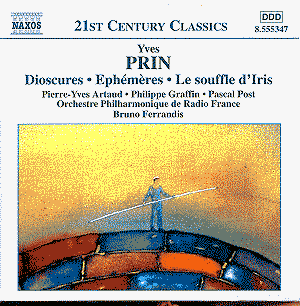Yves Prin may well be a new name to you as it is to
me; therefore it is particularly enterprising of Naxos to produce this
CD in their 21st Century Classics series
These are three fascinating but challenging works.
You will quickly notice that each one (rather like Boulez) has been
revised. Perhaps Prin makes a habit of this. You will also notice that
Naxos have taken over four years to release this disc which only weighs
in at 41 minutes. I wonder if the intention was to record one or more
works to add to it but the composer, who is a slow worker and who has
had patches of silence in his creative life, simply was not happy with
the works and is intending, in time, to revise them. Perhaps Naxos gave
up waiting.
As the back of the jewel case announces, Prin has also
been a conductor, particularly of contemporary music, and a pianist.
He has held several prestigious posts including that of guest conductor
to the Nouvel Orchestre Philharmonique de Radio France. Composing time,
until his recent retirement must have been limited. His career is not
unlike that of Pierre Boulez or possibly our own Oliver Knussen. In
fact Prin started composing after a chance meeting with Bruno Maderna
(1920-1973) a conductor himself (of almost entirely contemporary music)
and an avant-garde composer. That is where Prin is coming from, but
add to it a French sensibility and a fine ear for sonority and clear
orchestral textures and you are almost there. I found myself also thinking
of Henri Dutilleux from whom this quote could easily apply to Yves Prin,
"I wanted to present one or more ideas in different orders and contexts
so as to make them gradually change their true identities" (writing
about 'Metaboles' in 1994 for the Philips recording). Prin also shares
with Dutilleux the ability to think in long, lyrical lines as at the
end of ‘Dioscures’. Perhaps I have been able to give the reader some
idea as to what this composer is all about.
To take the three pieces in chronological order: 'Ephemeres'
is for me the weakest of the three, with its over excitable and structurally
problematic cadenza placed at about one quarter of the way through the
piece. The work is partially based on an earlier one for solo violin
and has a complicated history. The violin resorts to all kinds of ‘extra-mural’
activity to create interesting effects but to my ear, all to no avail.
With ‘Dioscures’ we are on surer ground. Its opening
is gripping, with "disembodied sounds of gongs and the piano from inside,
the cello entering with a rapt cantilena. The solo flute sounds a pensive
rejoinder, followed by a similarly circumspect contribution from the
clarinet". (Richard Whitehouse, in his clear and unpretentious booklet
notes.) The music is almost oriental and builds polyphonically and most
effectively over a pedal harmony. The inspiration behind this piece
is complex and creates a dreamlike atmosphere.
‘Le Souffle d’Iris’ is a flute concerto which also
starts with some fascinating, ‘night’ sounds. We hear the flute launching
into some of its unusual effects, such as blowing directly into the
instrument as if the player were warming it, flutter-tonguing, percussive
key noises and whistle tones. From the beginning an elusive atmosphere
is created over a gentle string tremolo and guiro, which seems to portend
tension and drama.
The performers obviously know the music well and are
perfectly in tune with its language and character. Their biographies
are set out in the booklet, and tell us that Pierre-Yves Artaud has
worked with Boulez and has played much contemporary music. Phillippe
Graffin has, amongst his other achievements, given the first performance
of David Matthews' Second Violin Concerto, and John-Pascal Post has
recorded CDs of music by Stravinsky. Bartók and Krotenburg. A
very fine group of soloists then and some superb orchestral work especially
so considering that the CD was probably made with the minimum amount
of session time.
Gary Higginson

![]() Orchestra Philharmonique
de Radio France conducted by Bruno Ferrandis
Orchestra Philharmonique
de Radio France conducted by Bruno Ferrandis ![]() NAXOS 8.555347 [41.03]
NAXOS 8.555347 [41.03]